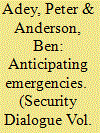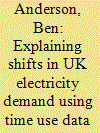|
|
|
Sort Order |
|
|
|
Items / Page
|
|
|
|
|
|
|
| Srl | Item |
| 1 |
ID:
112735


|
|
|
|
|
| Publication |
2012.
|
| Summary/Abstract |
In this article, we examine contemporary 'resilience' through UK preparedness - an apparatus of security enacted under the legal and organizational principles of UK Civil Contingencies and civil protection legislation and practices. By examining the design, practices and technologies that constitute the exercises performed within Civil Contingencies, the article first suggests that the manner in which exercises have been mobilized as examples of preparedness and apocalyptical imaginations of the 'unthinkable' should be understood within the highly specific societal and political contexts that shape them. More substantially, the article then provides a nuanced understanding of the life of the security assemblage through an in-depth analysis of the exercise and its design, materials, play and contingent relations. Seeking to deepen and widen concerns for what matters in security studies, animated by concern for objects, bodily affects, contingencies and excess, the article contends for a more serious concern with how security and its practices can surprise, shock, enthral and disrupt in a manner that need not only be associated with failure.
|
|
|
|
|
|
|
|
|
|
|
|
|
|
|
|
| 2 |
ID:
162311


|
|
|
|
|
| Summary/Abstract |
Peaks in electricity demand generate significant negative environmental and economic impacts. As a result, recent policy and research attention has focused on the potential for temporal flexibility of demand, especially in the context of intermittent low-carbon generation. Much of this work emphasises the need to understand what makes up the peak and to engineer solutions to meet this ‘normal’ consumption. However, today's patterns of temporal consumption may only be a snapshot of continuing change. This paper uses UK household time-use survey data to analyse change in temporal patterns of activities over the last 40 years to shed light on apparent temporal shifts in overall UK electricity demand. The results highlight long term evolution in when and where people work, travel, eat, use media and carry out social activities. In particular they suggest that changing patterns of labour market participation may be contributing to shifts in food related, personal/home care and media activities which correlates with shifts in electricity demand. We conclude that both stable and dynamic social structures and forms of organisation have direct implications for policy debates around current and future flexible demand-side solutions.
|
|
|
|
|
|
|
|
|
|
|
|
|
|
|
|
| 3 |
ID:
137688


|
|
|
|
|
| Summary/Abstract |
With smart metering initiatives gaining increasing global popularity, the present paper seeks to challenge the increasingly entrenched view that providing householders with feedback about their energy usage, via an in-home-display, will lead them to substantially reduce their energy consumption. Specifically, we draw on existing quantitative and qualitative evidence to outline three key problems with feedback, namely: (a) the limited evidence of efficacy, (b) the need for user engagement, and (c) the potential for unintended consequences. We conclude by noting that, in their current form, existing in-home-displays may not induce the desired energy-reduction response anticipated by smart metering initiatives. Instead, if smart metering is to effectively reduce energy consumption there is a clear need to develop and test innovative new feedback devices that have been designed with user engagement in mind.
|
|
|
|
|
|
|
|
|
|
|
|
|
|
|
|
|
|
|
|
|